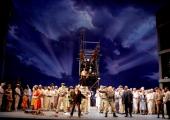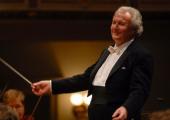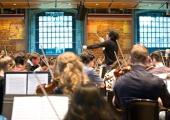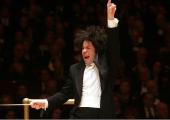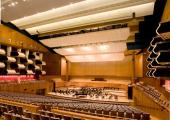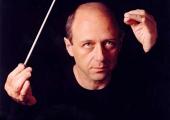Sir Colin Davis's year has not been a happy one. There've been heart problems, cancellations and, during a performance of The Magic Flute at Covent Garden last month, a major fall. Last night at the Barbican Hall he faced a strenuous Beethoven programme, the Third Piano Concerto with Jonathan Biss and the Seventh Symphony, and a new work by Romanian Vlad Maistorovici. Would the 83-year old conductor have enough energy to inject proceedings with the required welly?
There was as much welly as you could wish for. Understandably, he had assigned the mastery of Maistorovici's Halo to an undertsudy, Clemens Schuldt. It's not a particularly complicated piece but still no doubt benefited from the undivided attention of this young man. Its ebb and flow, most of which takes place in brass, woodwind and percussion, undergirded by a regular arpeggiated beat on strings that both harries and rocks, was reminiscent of Sibelius. A brief languid passage gives way to a faster, more colourful one that brings in snatches of Bartók and Stravinsky but that ultimately fails to shake off the rather suffocating beat, which rang on in the head after the work ended.
This was broken by the two lightning flash runs that announced the arrival of Beethoven's Third Piano Concerto and pianist Jonathan Biss at the keyboard in terrifically dramatic mode. It cut through a sluggish tempo that Sir Colin seems to have opted for for the opening orchestral statements. Biss took control of the reins and appeared to re-invigorate Davis who tarried with a much more suitably moody response. Biss's was the account of a true troubled traveller, full of changes of character - now the shouter, now the singer, now the imp - subsumed into one coherent and compelling voice.
The Largo saw some excellent pedalling that bled colours but never swamped them and the lolling head of the piano was perfectly put to sleep and then roused to action. Just as well. There are strange apparitions to be encountered in the mostly jaunty Allegro con brio and both Davis and Biss relished the arrival of every single one.
But how would Davis cope with that ultimate young man's work, the dashing romp that is the Seventh? With all the consummate ease and power of one of the world's great Beethoven interpreters. There was none of the colouristic reinvention of the Dudamel performance with the LA Philharmonic last month. But there was also no cutting of corners. Most importantly, and happily, there were very few signs of the tiredness that Davis seems to have been suffering from recently. This was a spirited performance, full of spring, brio and no small amount of fury. Speeds were fast but consistent. Woodwind were always able to graze quite happily in their fragrant clearings.
His attention was to the broad, natural sweep of the symphony rather than the many fine inner voices, the petticoats that can be admired and fiddled with till the cows come home. In this way, the melodic thread, which sometimes gets lost in lesser hands, was carried through every part, from the Verdi-like whirlwind of a dance in the Scherzo to the sinking double basses and singing horns of the finale. A masterclass in the art of conducting Beethoven had unfolded before us.
